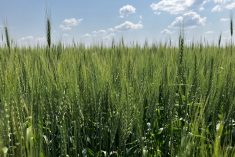CNS Canada –– With the Canadian dollar falling to its weakest levels relative to its U.S. counterpart in six years, the general sentiment holds it should be good news for exporters, such as Canadian grain farmers.
However, any net benefit may depend on what exactly is being exported and who is doing the buying, according to an analyst.
The Canadian currency moved to US79 cents on Thursday. Using canola as an example, that means the March canola contract trading Thursday at $C449 per tonne on the ICE Futures Canada platform would only cost US$354 in the international market.
Read Also

U.S. grains: Soy futures post biggest monthly gain in nearly five years on China trade optimism
U.S. soybean futures climbed to a 15-month high and posted their biggest monthly gain in nearly five years on Friday following a rally fueled by the prospect of revived exports to China.
At its most basic level, a weaker Canadian dollar is beneficial for Canadian exporters but detrimental for importers. For a Prairie farmer, this theory means they should be getting more Canadian dollars back for commodities sold into the global market, but also spending more of those dollars on anything imported, such as equipment or fertilizer.
While there is some truth to the general theory, the reality is a bit more nuanced.
For grain exports, a weaker Canadian dollar that makes exports cheaper for international buyers “works in a demand-pull environment, where the buyers are really interested in buying your product,” said analyst Mike Jubinville of ProFarmer Canada.
In that scenario, the benefit of the currency exchange is translated back to the farmer, he said, pointing to lentils as an example.
However, in a supply-push environment, where the grain has more challenges finding a home, the benefit of the currency exchange goes to the buyer, said Jubinville.
Wheat would be an example of a supply-push commodity, he said, as there are many competitors in the global market and other currencies are also going down relative to the U.S. dollar.
For canola, the impact is mixed. “The lowest canola prices I’ve ever seen came at a time when we had the weakest Canadian dollar, and some of the best canola prices I’ve ever seen came at a time when we had the strongest Canadian dollar,” said Jubinville, highlighting the fact that explaining the market is not as simplistic as saying “a weaker Canadian dollar equals higher canola prices.”
“A direct relationship”
While it depends on the commodity being sold, the potential returns for Canadian producers are also related to who is doing the buying.
“If you’re dealing in a direct relationship with the U.S., it works out,” said Jubinville, noting there was an increasing incentive to sell as much grain to the U.S. as possible.
However, the U.S. isn’t the main market for a majority of grains and oilseeds grown on the Prairies. As other world currencies are also declining relative to the U.S. dollar, those buyers aren’t really seeing the same currency-related savings when dealing with Canada.
Also, competing grain exporters such as Australia and Europe have also seen their currencies weaken, thus increasing their competitiveness internationally as well.
The currency exchange is also having a roundabout negative impact on Canadian fertilizer prices. While Canada is a net producer of nitrogen fertilizer, the pricing tends to be established in the U.S. Midwest.
From a U.S. point of view, buying Canadian product looks attractive, given the current exchange rates, so Canadian suppliers are selling into the U.S., said Jubinville.
The U.S. price may be going down because of increasing Canadian supplies, but Canadian prices are going up as Canadian growers are now competing with U.S. growers using the stronger U.S. currency.
— Phil Franz-Warkentin writes for Commodity News Service Canada, a Winnipeg company specializing in grain and commodity market reporting.













